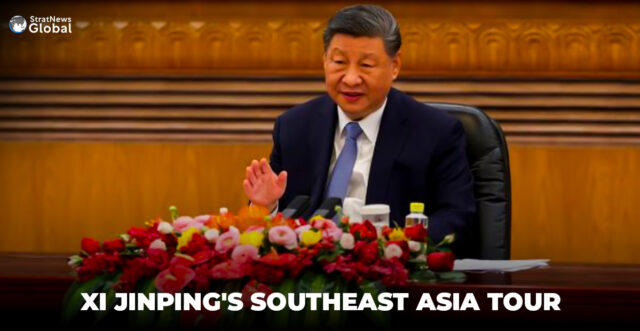Chinese President Xi Jinping is set to visit three Southeast Asian countries next week in his first foreign trip of the year, aiming to strengthen relations with neighbouring nations as trade friction with the United States continues to intensify.
Xi will visit Vietnam from April 14-15, and Malaysia and Cambodia from April 15-18, state-run Xinhua news agency reported on Friday.
China, hit with 145% U.S. tariffs since President Donald Trump took office this year, is quickly moving to reinforce relations with other countries who also lie in the shadow of Washington’s damaging trade levies.
Some of the countries hit by Trump’s reciprocal tariffs – Cambodia by 49%, Vietnam by 46% and Malaysia by 24% – have already begun reaching out to the United States for a reprieve, leaving China an outlier among the bilateral negotiations as tensions between Beijing and Washington continue to flare.
The rare bilateral visits to Southeast Asian nations mark a high-profile personal diplomatic outreach for Xi Jinping. Earlier this week, the Chinese president pledged to deepen “all-round cooperation” with China’s neighbouring countries.
China-Vietnam Agreements
On Monday, China and Vietnam are expected to sign about 40 agreements, two Vietnamese officials said, noting they would include documents on railways.
Both sources declined to be named as they are not authorised to speak to the media.
Vietnam has approached China for funding and technology to develop its railway network; and the two countries’ previous high-level visits have often included deals on railway cooperation.
One of the sources said other agreements would be signed by defence and police ministries. It is unclear whether these agreements are binding and include financial commitments. In past state visits, most signed agreements were non-binding.
Xinhua news agency said it was set to run feature articles on Xi’s visit to Southeast Asia, including pieces on how “flowing water cannot be severed” between China and Malaysia, and about Xi and his “ironclad friends” from Cambodia.
In the days before and after Trump’s reciprocal tariffs took effect on April 9 – most of which have since been paused except for China – Beijing had already started to persuade regional blocs around the world to hold a common line against the punitive U.S. levies.
Chinese Commerce Minister Wang Wentao held video calls with his counterparts from the European Union and Malaysia, as well as Saudi Arabia and South Africa.
This week, Premier Li Qiang spoke with European Commission President Ursula von der Leyen by phone, during which they emphasised Europe and China’s responsibility to support a “strong reformed trading system, free, fair and founded on a level playing field”.
(With inputs from Reuters)

















 Afrikaans
Afrikaans Albanian
Albanian Amharic
Amharic Arabic
Arabic Armenian
Armenian Azerbaijani
Azerbaijani Basque
Basque Belarusian
Belarusian Bengali
Bengali Bosnian
Bosnian Bulgarian
Bulgarian Catalan
Catalan Cebuano
Cebuano Chichewa
Chichewa Chinese (Simplified)
Chinese (Simplified) Chinese (Traditional)
Chinese (Traditional) Corsican
Corsican Croatian
Croatian Czech
Czech Danish
Danish Dutch
Dutch English
English Esperanto
Esperanto Estonian
Estonian Filipino
Filipino Finnish
Finnish French
French Frisian
Frisian Galician
Galician Georgian
Georgian German
German Greek
Greek Gujarati
Gujarati Haitian Creole
Haitian Creole Hausa
Hausa Hawaiian
Hawaiian Hebrew
Hebrew Hindi
Hindi Hmong
Hmong Hungarian
Hungarian Icelandic
Icelandic Igbo
Igbo Indonesian
Indonesian Irish
Irish Italian
Italian Japanese
Japanese Javanese
Javanese Kannada
Kannada Kazakh
Kazakh Khmer
Khmer Korean
Korean Kurdish (Kurmanji)
Kurdish (Kurmanji) Kyrgyz
Kyrgyz Lao
Lao Latin
Latin Latvian
Latvian Lithuanian
Lithuanian Luxembourgish
Luxembourgish Macedonian
Macedonian Malagasy
Malagasy Malay
Malay Malayalam
Malayalam Maltese
Maltese Maori
Maori Marathi
Marathi Mongolian
Mongolian Myanmar (Burmese)
Myanmar (Burmese) Nepali
Nepali Norwegian
Norwegian Pashto
Pashto Persian
Persian Polish
Polish Portuguese
Portuguese Punjabi
Punjabi Romanian
Romanian Russian
Russian Samoan
Samoan Scottish Gaelic
Scottish Gaelic Serbian
Serbian Sesotho
Sesotho Shona
Shona Sindhi
Sindhi Sinhala
Sinhala Slovak
Slovak Slovenian
Slovenian Somali
Somali Spanish
Spanish Sundanese
Sundanese Swahili
Swahili Swedish
Swedish Tajik
Tajik Tamil
Tamil Telugu
Telugu Thai
Thai Turkish
Turkish Ukrainian
Ukrainian Urdu
Urdu Uzbek
Uzbek Vietnamese
Vietnamese Welsh
Welsh Xhosa
Xhosa Yiddish
Yiddish Yoruba
Yoruba Zulu
Zulu